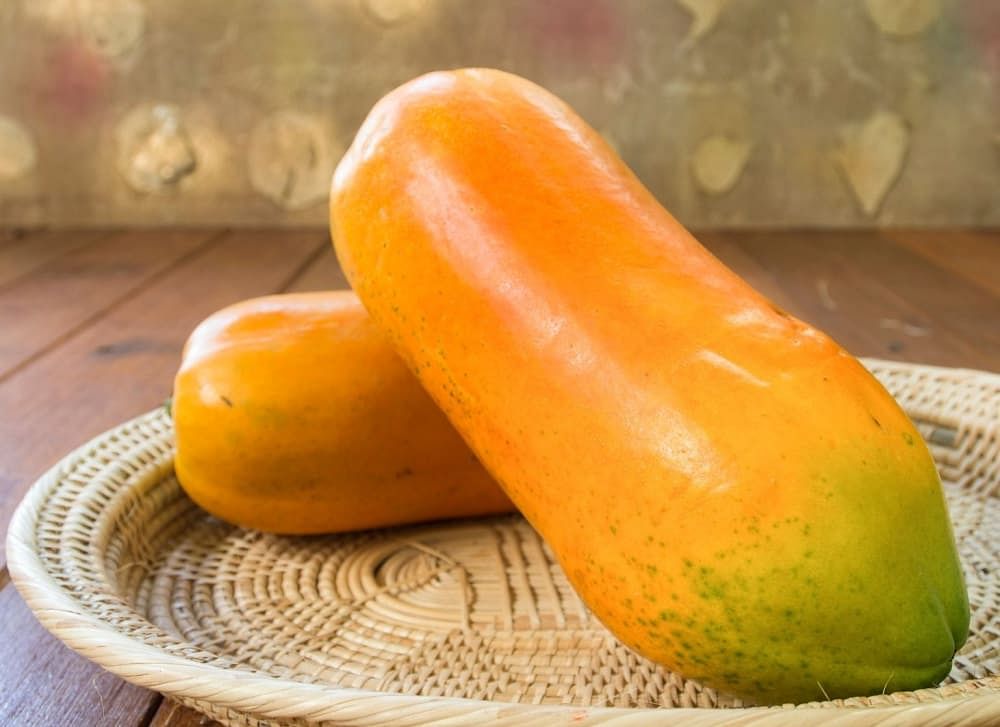A balanced and nutritious diet is crucial for pregnant women. It not only affects the health of the mother but also impacts the development of the fetus. Some food items might not be suitable for you during this time as they may be harmful to the developing baby and cause many other complications during your pregnancy.
One of such food items is papaya. There is a lot of confusion related to its consumption during pregnancy. In this article, we will be sharing the benefits and side-effects of papaya, along with what precautions you should take while eating this fruit.
Is it Safe to Eat Papaya in Pregnancy?
Yes, it is safe to eat papaya in pregnancy, but it should be ripe. You should avoid semi-ripe or unripe papaya when you are expecting.
Semi-ripe or unripe papaya contains an enzyme called latex (white milky fluid). It has papain that can induce unnatural contractions in your uterus (uterine or womb contractions) and secretion of a group of compounds called prostaglandin. Thus unripe papayas increase the risk of miscarriage or premature birth of the baby.
Unripe or semi-ripe papaya also weakens the crucial membranes that support your fetus, thereby decreasing the chances of its survival. Consumption of raw papaya during the first 3 months of your pregnancy may result in bleeding or hemorrhages from the edge of the placenta.
Benefits of Eating Papaya During Pregnancy
Here are some benefits of eating fully ripe papaya in pregnancy:
- It helps in controlling respiratory disorders.
- It has high fibre and antioxidant contents such as Vitamin A, B, C, potassium, and beta-carotene. So it is helpful to manage digestive discomforts and constipation issues, which are common during pregnancy.
- It keeps you hydrated.
- The antioxidants present in papaya help in eliminating free radicals.
- Vitamins of papaya help in boosting your immunity and reduce susceptibility to infections.
- It may help in overcoming morning sickness and uplift your mood.
- It gives you energy during pregnancy.
- Folic acid present in raw papaya helps in your baby's neurological development.
- It promotes better heart health and may reduce the risk of colon cancer.
- It helps increase haemoglobin levels in your body. If you’re suffering from anaemia during your pregnancy, consumption of well-ripened Papaya, in moderation, helps in the formation of red blood cells (RBC).
Side-effects of Eating Papaya In Pregnancy
Mentioned below are the side effects of consuming raw papaya in pregnancy:
1) Causes Abnormal or Unnatural Uterine Contractions:
Latex in unripe papaya can lead to abnormal or unnatural womb contractions and premature labour. It can stimulate and increase menstrual flow and may lead to miscarriage.
2) Hinders or Slows Down Fetal Development:
Raw papaya has pepsin and papain, which impedes the development of the fetus and reduces the chances of its further growth. Raw papaya can also hamper implantation, expose you to the risk of miscarriage after the implantation and cause potential harm to your embryo.
3) Poses a Threat to the Vital Membrane of the Fetus:
It retards or weakens cell growth and restricts the development of the tissue in the fetus.
4) May Cause Haemorrhage and Oedema:
Raw papaya can increase vascular pressure and may lead to internal haemorrhage or bleeding in the placenta. This can cause complications during your pregnancy or at delivery time. Papaya damages the placenta, exposing the baby to the risk of getting infected.
5) Accelerates Bowel Movement:
Papaya has fibre that increases bowel movement. However, excessive bowel movement puts pressure in and around your uterus that may result in miscarriage.
6) Causes Kidney Stones And Raises Intra-Abdominal Pressure:
Consuming excessive papaya promotes the formation of kidney stones. The stones may cause colicky pains that can increase the intra-abdominal pressure, which affects your pregnancy.
7) Stimulates Oestrogen Production:
Papaya increases your body temperature and promotes estrogen production in pregnancy, leading to menstrual bleeding. Such bleeding is a sign of impending abortion or ectopic pregnancy (embryo gets implanted in the fallopian tube).
Why are Unripe Papayas not Good for Pregnant Women?
Unripe papaya is harmful to the fetus because of the presence of latex and papain. Your body can mistake papain for prostaglandins. This can cause miscarriage, premature birth, or other pre as well as post-delivery complications.
How many papayas Should A Pregnant Woman Eat?
You can have a bowl of fully ripe papaya during pregnancy. If it causes indigestion, constipation or vomiting, etc., immediately stop consuming and consult a health expert or gynaecologist.
Precautions to Take While Eating Papaya During Pregnancy
Following are the necessary precautions you should take while eating papaya in pregnancy:
- Make sure the papaya is fully ripe. Fully ripe papaya has yellow skin, is orange-amber, and is soft to touch.
- Don’t consume papaya seeds and leaves.
- Avoid papayas with black spots or bruises.
- Don’t eat excessive papaya as it may increase your bowel movement.
- If you experience any digestive discomfort or bleeding, stop eating papaya and consult your doctor.
Fruits to Eat Instead of Papaya in Pregnancy
You can have other fruits instead of papaya, such as:
1) Orange:
It contains a high amount of fibre and vitamin C. It keeps you hydrated, promotes iron absorption in your body, and strengthens your immune system.
2) Pomegranate:
It is rich in Vitamin K, calcium, iron, fibre, and protein. It strengthens the placenta against infections and injury.
3) Grape:
It has folates, vitamins, fibre, and antioxidants, which not only strengthen your immune system but also help you to cope up with the biological changes occurring during pregnancy.
4) Apple:
It is loaded with Vitamin A, Vitamin C, potassium, and fibre. It nourishes the fetus and boosts its growth in your womb.
5) Guava:
It has Vitamin C, Vitamin E, carotenoids, and folates. These nutrients help treat digestion and constipation and relax your muscles and joints.
Also Read: Guava in Pregnancy: Benefits, Side Effects and More












